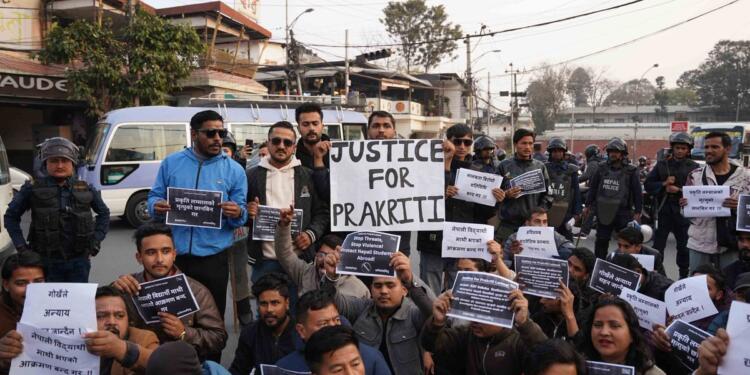A tragic incident at Kalinga Institute of Industrial Technology (KIIT) in Odisha has sparked tensions after Prakriti Lamsal, a Nepali student, was found dead in her hostel room. The third-year B.Tech student allegedly died by suicide, and a complaint filed by her cousin in Bhubaneswar accuses a male student of blackmailing her. The Bhubaneswar police have taken the accused into custody and registered a case of abetment to suicide. The authorities have also seized Prakriti’s mobile phone, laptop, and other belongings for further investigation.
Following the incident, several Nepali students at KIIT staged protests, demanding justice for Prakriti. The situation escalated as reports surfaced that some Nepali students were forcibly evicted from their hostels and dropped at Cuttack Railway Station, despite having upcoming exams on February 28. While the university administration claimed that these measures were taken for their safety, the forced removal of students added to the unrest. Many students alleged that they faced mistreatment and discrimination from the KIIT management.
In response to the growing tensions, Nepal’s Prime Minister KP Sharma Oli addressed the incident, acknowledging the concerns of Nepali students studying in India. He assured that the Nepalese government is actively engaged with Indian authorities through diplomatic channels to ensure justice and the well-being of Nepali students. The Nepalese Embassy in New Delhi has also dispatched two officers to Odisha to counsel affected students and provide necessary assistance. According to PM Oli’s statement, students have been given the option to either remain in their hostels or return home, based on their preference.
A History of Friendship Between India and Nepal
The unfortunate death of Prakriti Lamsal is a tragic event, and justice must be served. However, it is crucial to remember that India and Nepal share a deep-rooted historical and cultural relationship. For centuries, the two nations have maintained strong bonds of friendship, unity, and mutual respect. The connection between India and Nepal goes beyond political ties it is a relationship built on shared traditions, languages, and values.
The armed forces of both countries recognize this special bond, as India and Nepal have a tradition of appointing each other’s Army Chief as an honorary General of their respective armies. This unique practice symbolizes the close military and diplomatic relations between the two nations. Furthermore, the cultural and religious heritage shared by India and Nepal has always been a pillar of unity. The people of both countries have lived together in harmony for generations, and this strong bond must not be overshadowed by an unfortunate incident at a single institution.
Justice, Not Prejudice
It is essential to approach this tragic event as an individual case of crime and justice, rather than through the lens of racism or diplomatic conflict. The allegations against the accused must be thoroughly investigated, and if found guilty, he must be held accountable for his actions. At the same time, the KIIT administration must be questioned for its mishandling of the situation. Reports of racist slurs and mistreatment of Nepali students must be addressed with strict action against those responsible.
Encouragingly, a significant number of Indian students have joined the movement demanding justice for Prakriti and the Nepali students who suffered discrimination. This reflects the solidarity and brotherhood shared between Indian and Nepali students, emphasizing that this issue is not about nationality but about upholding justice and fairness.
Instead of allowing this tragic event to create division, it should bring people together in the pursuit of justice and accountability. India stands in full support of Nepal in seeking justice for Prakriti Lamsal, and the focus should remain on ensuring that such incidents do not occur in the future. The tragedy at KIIT should not be seen as a diplomatic conflict but as an unfortunate incident that demands justice, fairness, and institutional reforms.

























